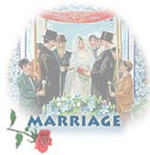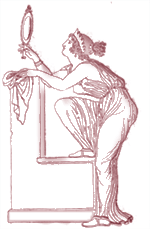|


| Like
their non-Jewish neighbors, Jews in antiquity (regardless of place and time)
thought that beauty was good. When, for example, Jewish Hellenistic writers
dilate upon the beauty of biblical characters when the Bible mentions it,
they are following a well-worn classical trope. In this sense, beauty was
culturally loaded: Jews, Greeks, Romans, and Babylonians all thought themselves
to be beautiful and descendants of beautiful people. In itself, beauty was
perceived as good, and even the rabbis often (but not always) saw it as
reflecting moral goodness.... |
In the first century CE,
a Roman philosopher, Musonius Rufus, wrote:
Therefore those who contemplate marriage ought to have regard neither for
family, whether either one be of highborn parents, nor for wealthy, whether
on either side there be great possessions, nor for physical traits, whether
one or the other have beauty. For neither wealth nor beauty nor high birth is
effective in promoting partnership of interest or sympathy, nor again are they
significant for producing children.[1]
Although Jewish Hellenistic
writers echo the classical advice that a man not consider dowry in choosing
a wife, they never suggest that beauty should not be a criterion in choosing
a wife. "A beautiful (hen) wife makes her husband happy, and her
good sense fattens his bones . . . beauty upon beauty is a modest wife, and
there is no price to her chastity," Ben Sira states. Elsewhere, too, Ben
Sira notes the value of having a beautiful wife.[2]
While we have no explicit evidence from the Second Temple period that female
beauty played a practical role in the selection of a wife, we are probably safe
to infer such a role.
 Rabbinic
literature clearly assumes the importance of female beauty for attracting a
husband. Several rabbinic sources assume that women attracted prospective husbands
through their appearance; on the road, in the market, or in a courtyard a man
might catch sight of a woman. Perhaps a man might even ask his female relatives
to "scout out" an attractive woman for him in the bathhouse. These
glimpses were important: they were probably frequently the first step in the
process of making a match. Not only did the single women themselves then have
an interest in being attractive, but so too did their fathers (or guardians).
The rabbis advise a father to dress his daughters well "so that men will
rush to them."[3]
One Babylonian rabbi relates his recipe for keeping his daughter's complexion
clear, and a Babylonian story portrays a man doing such a fine job depilating
his daughter that it raised the amount of her marriage settlement.[4]
Even the statement that knowing Greek helps a woman attract a husband —
the single statement that any personal attribute other than beauty matters —
compares such a knowledge to an ornament; it uses a physical metaphor.[5] Rabbinic
literature clearly assumes the importance of female beauty for attracting a
husband. Several rabbinic sources assume that women attracted prospective husbands
through their appearance; on the road, in the market, or in a courtyard a man
might catch sight of a woman. Perhaps a man might even ask his female relatives
to "scout out" an attractive woman for him in the bathhouse. These
glimpses were important: they were probably frequently the first step in the
process of making a match. Not only did the single women themselves then have
an interest in being attractive, but so too did their fathers (or guardians).
The rabbis advise a father to dress his daughters well "so that men will
rush to them."[3]
One Babylonian rabbi relates his recipe for keeping his daughter's complexion
clear, and a Babylonian story portrays a man doing such a fine job depilating
his daughter that it raised the amount of her marriage settlement.[4]
Even the statement that knowing Greek helps a woman attract a husband —
the single statement that any personal attribute other than beauty matters —
compares such a knowledge to an ornament; it uses a physical metaphor.[5]
In contrast to the ideological
and cultural understanding of "beauty," the role of beauty in the
selection of a wife is a practical matter. In the case of the unattractive woman,
ideological and practical values collide. The contradiction between the practical
difficulties encountered by unattractive women in the marriage market and ideological
self-perception as a "beautiful" people stands behind one of the more
poignant stories in the Mishnah:
[If a man says,] "I
vow [qonam] that I will not marry so-and-so, who is ugly," and she is really
attractive; "[or that I will not marry so-and-so,] who is dark," and
she is really light; "[or that I will not marry so-and-so,] who is short,"
and she is really tall — [in all these cases] he is
permitted to marry her. [The reason is] not because she was ugly and made attractive,
or that she was dark and was made light, or that she was short and was made
tall, but because the vow was mistaken.
Once a man vowed [not to enjoy] the daughter of his sister. They brought her
to the School of Rabbi Yishmael, and he beautified her. Rabbi Yishmael [then]
said to him, "My son-is this what you vowed not to enjoy?" He said
to him, "No!" And Rabbi Yishmael permitted her to him.
At that moment, Rabbi Yishmael wept and said, "The daughters of Israel
are beautiful, but poverty makes them unattractive."
When Rabbi Yishmael died the daughters of Israel raised a dirge.[6]
….Female virginity,
as the citation above from Ben Sira illustrates, was considered to be closely
related to beauty. Like beauty, female virginity was widely valued throughout
the Mediterranean and Near East. Philo and Josephus essentially repeat classical
banalities when they emphasize that Jewish men prefer to marry virgins.[7]
One reason for this value on female virginity at marriage was certainly to assure
the paternity of the progeny. Female virginity, however, also carried a heavy
symbolic value….
Most Jewish groups expected
that a woman would marry, and would marry as a virgin. In its marital regulations,
the Qumran community stressed the importance of a man marrying a virgin. Qumran
documents even contain provisions for physically examining a woman to confirm
her virginity. This emphasis on female virginity at marriage is most likely
linked to the group's general perception of itself as pure. Similarly, Second
Temple writers (following biblical precedents) emphasize that a Jewish priest
should (or must) marry a virgin, and that the daughter of a priest especially
was expected to be a virgin when she married. Rabbinic writers continue to emphasize
the importance of virginity in connection to the priesthood.
A more widespread cultural
interpretation placed on female virginity was its connection to moral character.
A woman who had engaged in premarital sex was "bad news," being perceived
as lacking the fundamental value of modesty. A woman who was discovered to have
had premarital sex could acquire a "reputation," and it seems that
fear of such reputations and gossip were a primary social means of controlling
female sexual behavior. The Mishnah, for example, mentions the case of a man
who suspected that his wife was having an affair because he "heard it from
a bird."[8]
A tosefta contrasts the proselyte woman, whom all want to marry because
she is presumed to have guarded herself sexually, to the freed slave woman,
who is a less desirable marriage partner because such women "generally
are sexually promiscuous."[9]
This value is not limited to rabbinic circles: grave inscriptions occasionally
emphasize that a young woman lived a "chaste" life. Behind this advice
is less concern with the certainty of paternity or with the purity of the people
than it is concern with the future behavior of one's wife. A woman who "strayed"
before marriage was seen as likely to stray during it.
Jewish sources from antiquity
ascribe no importance to male beauty for making a match. Our sources do generally
emphasize the beauty of Jewish men, but these statements are ideological rather
than practical. The general presupposition of rabbinic texts is that a woman
will marry any suitable man who proposes. Nevertheless, a few isolated rabbinic
dicta indicate that male appearance was not entirely irrelevant. One mishnah
assumes that a woman would not want to marry a man with one of a number of particularly
disgusting diseases.[10]
The implication of the passage is that a woman did take a look at whom she was
marrying and could object to the match if she saw something that she did not
like.[11]
While male beauty was not
entirely irrelevant in mate selection, the extent of its importance is difficult
to gauge. Our sources clearly downplay the importance of male beauty, which
is expected in a literature written by and mainly for men. But given the demographic
realities, male appearance might really not have been terribly important. A
thirteen- to sixteen-year-old girl was not in a good position to judge the beauty
of her older suitor, especially if her parents were exerting pressure. And we
should probably assume that a girl's father would want to avoid matching his
daughter with a cripple or a man with some other obvious and serious defect
but would be more tolerant of other blemishes, if only because he might see
them in himself.
Female virginity was a sine
qua non, but male virginity was a case of non sequitur. For nearly all ancient
writers, "virginity" referred to women; there is no word in Hebrew
or Greek for a male who has not had sexual intercourse. There were some Jewish
ascetic groups in antiquity, and there were (weak) ascetic trends in rabbinic
Judaism. None of these groups (except perhaps some early Christians) put a value
on male virginity at marriage.
 |
[1]
Musonius Rufus XIIIB [back]
[2]
Ben Sira 26:13, 15; 36:27
[back]
[3] BT Kiddushin 30b
[back]
[4] BT Shabbat 80b [back]
[5] JY Shabbat 6:1, 7d, JT Pe. 1:1, 15c; JT sotah 9:16,
24c [back]
[6] Mishnah Nedarim 9:10
[back]
[7] Josephus, Ant. 4:2444; Philo Spec leg. 3.51 [back]
[8] Mishnah Sotah 6:1 [back]
[9] BT Hor. 2:11; JT Hor. 3:8, 48b [back]
[10] Mishnah Ketubbot 7:9-10 [back]
[11] Gen. Rabbah 60:15 [back]
|
 |
 From:
Jewish Marriage in Antiquity, 116-120, by Michael L. Satlow, Copyright
© by 2001 Princeton University Pres. From:
Jewish Marriage in Antiquity, 116-120, by Michael L. Satlow, Copyright
© by 2001 Princeton University Pres.
|
MARRIAGE
Table of Contents
|



